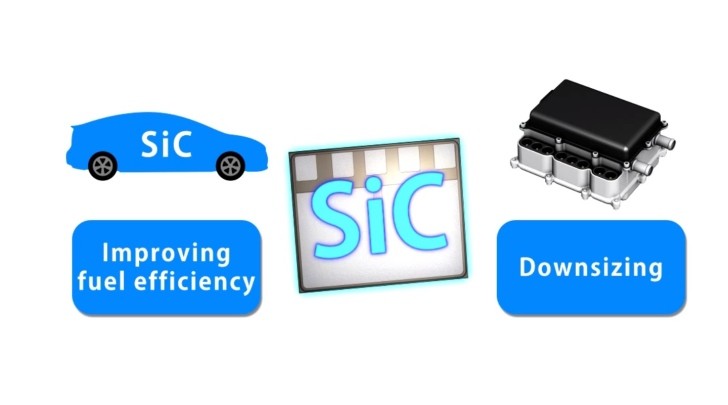This might sound a bit boring at first, especially if you watch the video Toyota released along with the information, but in case you were planning to buy the 2015 Prius or other Toyota hybrid in the future, here’s how science will make it even more efficient.
Every hybrid or electric vehicle needs a battery, an electric motor (which also acts as a generator) and a power control unit (PCU) which is utterly important to make the whole system work.
Without the PCU, you can’t modulate the amount of electric current dispatched to the motor. So the throttle would be basically either ON of OFF, a thing that you really don’t need in today's traffic.
Through heating, a large part of the power gets lost, and in this case we’re talking about 25 percent. This happens a lot in current hybrid vehicles that are using only silicon PCUs, and there is also a delay in power delivery.
That’s not all! Making the PCU’s internals more efficient, means they can also reduce their size by a whopping 80 percent. And along with them, the coil and capacitor gets to shrink. So the vehicle will get more space and less weight.
Each Prii generation came with a 10 percent fuel efficiency improvement over the one going out, and the 2015 model will surely benefit from this. Add the fact that Toyota also worked a lot to improve their gasoline engines and that the new model will have better aerodynamics and you can count on it to be the most efficient hybrid so far.
Don’t forget to watch the boring but useful video below.
PCU? Never heard of that...
The PCU acts almost like a steam locomotive regulator, which controls how much steam goes into the cylinders. Same does the PCU, but it regulates the amount of electric current coming in and out of the battery. The industrial revolution saves the day!Without the PCU, you can’t modulate the amount of electric current dispatched to the motor. So the throttle would be basically either ON of OFF, a thing that you really don’t need in today's traffic.
Mmkay... so what’s wrong with it?
Now, as you can imagine, when a large amount of electrical current needs to pass through something, that something will heat up. And unless you want to transform your vehicle into a huge radiator to get cozy in when cold outside, heat is the exact opposite of what you need.Through heating, a large part of the power gets lost, and in this case we’re talking about 25 percent. This happens a lot in current hybrid vehicles that are using only silicon PCUs, and there is also a delay in power delivery.
And the solution is?
To counter the problem, Toyota in collaboration with Denso has developed a silicon carbide (SiC) power semiconductor to be used in vehicle PCUs. Adding carbon to the previous mix, makes the semiconductors more efficient and more responsive, less heat is generated and power lags are cut.That’s not all! Making the PCU’s internals more efficient, means they can also reduce their size by a whopping 80 percent. And along with them, the coil and capacitor gets to shrink. So the vehicle will get more space and less weight.
How am I gonna feel this?
Well, it’s pretty simple. The weight-saving part is not that big, but the PCU’s efficiency is expected to increase Toyota’s hybrid vehicles fuel efficiency by 10 percent (based on the JC08 test cycle).Each Prii generation came with a 10 percent fuel efficiency improvement over the one going out, and the 2015 model will surely benefit from this. Add the fact that Toyota also worked a lot to improve their gasoline engines and that the new model will have better aerodynamics and you can count on it to be the most efficient hybrid so far.
Don’t forget to watch the boring but useful video below.

